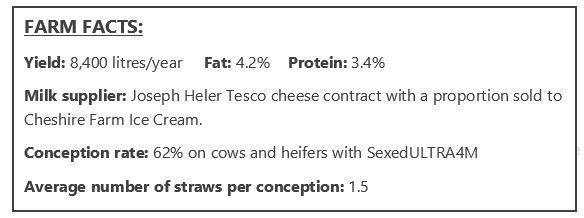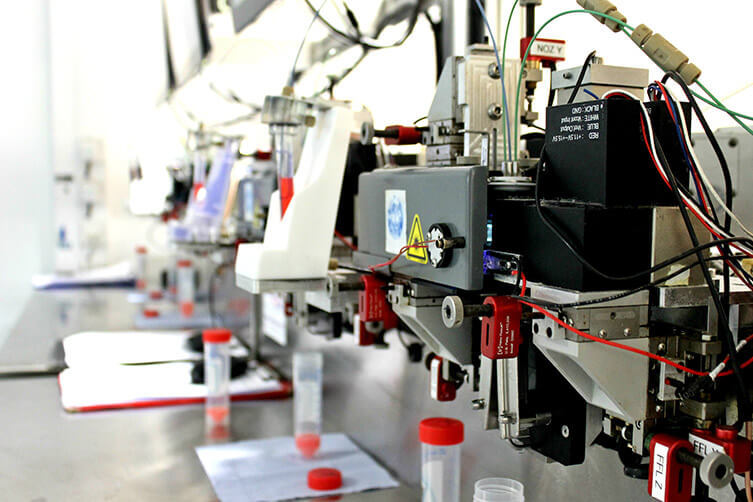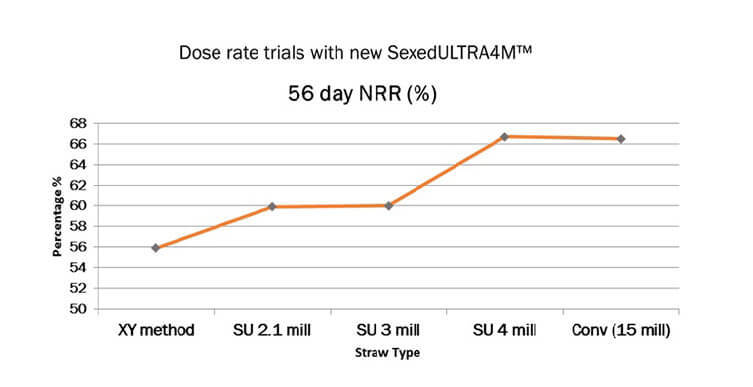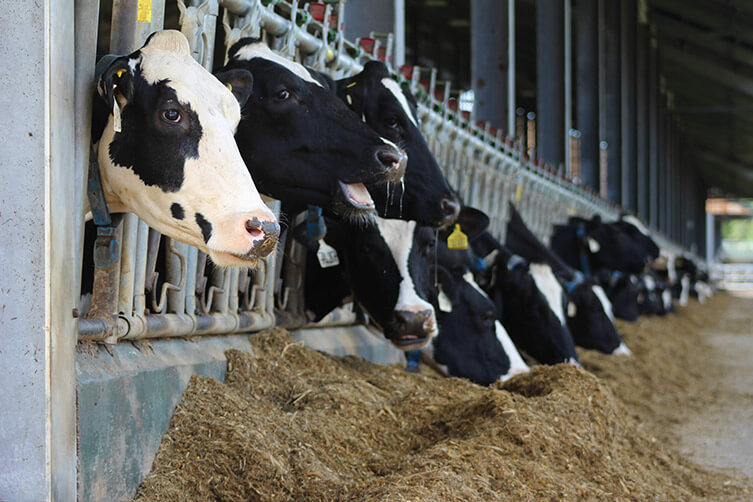'Updated sexed product takes inseminations to new level'
Read more on the excellent results Grosvenor Farms have been achieving using SexedULTRA 4M on the herd.
Article written by Ann Hardy Source: British Dairying Magazine
Mark Roach, managing director of Grosvenor Farms, is feeling reassured by the performance of the 1,770-head dairy herd he oversees as part of the Duke of Westminster's home farm estate in Cheshire.

For not only has the herd exceeded his most optimistic expectations in terms of health and performance since it recently moved to its new, state-of-the-art facilities at Lea Manor Dairy, it has also now convinced him it is possible to achieve equally good conception rates with sexed as with conventional semen.
The team at Grosvenor had been using sexed semen for many years, but like most producers, they only felt confident in doing so in any quantity on their maiden heifers.
But since the farm's sister company, Cogent, joined forces with US-based STgenetics late last year, they knew the performance of the sexed semen they were using had moved up a gear.
New sorting machines installed at Cogent's Aldford premises were able to work with greater efficiency and speed than the earlier generation equipment they replaced, with the result that the semen sorting process was achieved with far less wastage than ever in the past.

The upshot was that by using this most up-to-date equipment, Cogent were able to include four million sperm cells in every straw of semen they filled.
This was double the quantity previously included and was already known - through both trial results and anecdotal evidence from around the world - to achieve significantly better conception rates than any sexed product used in the past.
"We were particularly excited by results we had seen in a German trial carried out by GGI [German Genetics International GmbH] which had provided compelling evidence that increasing the dose rate to four million sperm cells per straw would lift conception rates," says Mr Roach.
These results are seen in the graphs shows that the 56 day non-return rate for cows and heifers in the trial increased significantly, to over 66 percent. This was up from around 60 percent, which was achieved using the previously marketed sexed semen, filled at around two million sperms per straw.

Cogent have now adopted the 4M technology across all bulls they sex for the dairy market and meanwhile, decided to conduct some trials of their own on the Grosvenor herd.
"We knew if these results could be replicated it would be a game-changer," says Mr Roach. "And of course, we wanted to see how the product would perform on our own farm."
Mark Farrall, the herd manager at Grosvenor introduced the product, branded SexedUltra 4M, to the Grosvenor herd in November 2017.
"We decided we would use the product on our first lactation heifers," he says. "This was a group we had never had the confidence to breed with sexed semen before."
The results are being measured on an ongoing basis, but by the end of February 2018, 135 milking heifers had been inseminated with the 4M straws alongside 108 with conventional, unsexed semen.
"The procedure was that we would serve the milking heifers with 4M semen for their first and second service, but if they returned to heat, we would serve them for a third service with unsexed semen," he says.
"We served 90 percent of the first calvers with 4M, only excluding those with a potential problem, such as cases of metritis, no reference heat or a bad calving," he says.
Conception rates for these two groups have now been recorded as 48 percent for the SexedUltra 4M semen and 46 percent for the conventional, unsexed semen.
"These results are in line with other trial results we have seen and have given us the confidence to push ahead with sexed semen in milking cows," says Mr Roach. "We are very happy with a conception rate with sexed semen of 48 percent in a group of 200 milking heifers averaging 37 litres a day."
Mr Farrall points out that the herd's conception rate and heat detection feeds through to an overall 21-day pregnancy rate which runs between 28 and 30 percent - substantially more than the UK's national average and a figure which has remained unchanged during their switch from unsexed to sexed semen.
The results of this informal trial on the Grosvenor herd are causing the team to review their protocols and they now plan to use SexedUltra 4M on all maiden and lactating heifers and extend it to second calvers and beyond, if there is a good genetic reason to do so and the cow is in good health.
"As our selection of animals to be bred to 4M has widened, so the results have become more consistent," says Mr Farrall. "Each week that passes has given us more confidence to go further and now, we are looking for animals not to serve with 4M."
The reality for the Grosvenor herd - renowned for its production of 12,500 litres at 3.78% fat and 3.31% protein (3x) - is that 60 heifer calves are now born on the farm every month, compared with 40 under the previous regime when the lower dose sexed semen was used on maiden heifers only.
"This massively increases our selection intensity and allows us to breed from our very best," says Mr Roach. "Although ironically, if we were not expanding the herd [it's on schedule to reach 2,000 head by 2020] we would only need to breed replacements from our maiden and first calf heifers and could put the rest to beef."
From a broader perspective, he feels the use of high-dose sexed semen has welfare and consumer implications which will help the dairy industry.
"Many producers are under pressure from their milk buyers not to produce pure Holstein bull calves. This technology not only helps them in this ambition, but - by potentially allowing them to dispense with the use of unsexed dairy semen altogether - it also provides more opportunity to produce higher quality beef.
"In fact, I think this new evidence tells us that if an animal is not fit to serve with 4M, she is probably not fit to serve to conventional dairy semen either - and would be better served to beef."
Grosvenor Farms Facts
· 1,770 milking cows, increasing to 2,000 over the next two years
· Production of 12,500kg at 3.78% fat and 3.31% protein (3x)
· Now serving maiden and first calf heifers to high-dose sexed semen
· 60 heifer calves born/month, compared with 40 born/month previously
· Extending sexed semen usage to high genetic merit older cows
